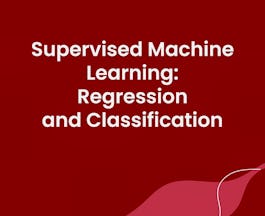4,025 results for "artificial intelligence"

Imperial College London
Skills you'll gain: Algebra, Linear Algebra, Mathematics, Machine Learning, Mathematical Theory & Analysis, Computer Programming, Python Programming, Machine Learning Algorithms, Calculus, Computational Logic, Algorithms, Differential Equations, Problem Solving, Statistical Analysis, Dimensionality Reduction, Computer Programming Tools, Statistical Programming, Regression

DeepLearning.AI
Skills you'll gain: Machine Learning, Machine Learning Algorithms, Regression, Applied Machine Learning, Algorithms, Statistical Machine Learning, Mathematics, Critical Thinking, Machine Learning Software, Python Programming

Skills you'll gain: Business Intelligence, Data Analysis, Data Management, Data Model, Data Visualization, Extract, Transform, Load, Leadership and Management, Strategy, Tableau Software
 Status: Free
Status: FreeMacquarie University
Skills you'll gain: Computational Thinking, Critical Thinking, Machine Learning

Google Cloud
Skills you'll gain: Financial Analysis, Machine Learning, Finance, Investment Management, Algorithms, Financial Management, Leadership and Management, Market Analysis, Risk Management, Strategy, Artificial Neural Networks, Deep Learning, Google Cloud Platform, Human Learning, Training, Cloud Computing, Reinforcement Learning, Python Programming

IIT Guwahati
Skills you'll gain: Data Visualization, Python Programming

Imperial College London
Skills you'll gain: Planning

Skills you'll gain: B2B Sales, Machine Learning

Skills you'll gain: Python Programming, Data Science, Machine Learning, Data Analysis, Algorithms, Data Analysis Software, Data Management, Data Visualization, Human Learning, R Programming, Business Analysis, Computer Programming, Data Structures, Database Application, Databases, Deep Learning, Exploratory Data Analysis, Machine Learning Algorithms, Plot (Graphics), SQL, Data Model, Statistical Machine Learning, General Statistics, Probability & Statistics, Regression, Reinforcement Learning, Big Data, Cloud Computing, Data Mining, IBM Cloud, Writing

Skills you'll gain: Machine Learning, Google Cloud Platform, Applied Machine Learning, Human Learning, Cloud Computing, Machine Learning Software, Cloud Platforms, Machine Learning Algorithms, Deep Learning, Tensorflow, Feature Engineering, Artificial Neural Networks, Training, Exploratory Data Analysis, DevOps, Python Programming, Cloud-Based Integration, Data Analysis, Data Visualization, Probability & Statistics, Statistical Programming, Big Data, Regression, Statistical Visualization, SQL, Algorithms, Continuous Integration, Cloud API, Apache, Extract, Transform, Load, Docker (Software)
 Status: Free
Status: FreeUniversity of California, Santa Cruz
Searches related to artificial intelligence
In summary, here are 10 of our most popular artificial intelligence courses
- Mathematics for Machine Learning: Imperial College London
- Supervised Machine Learning: Regression and Classification: DeepLearning.AI
- Google Business Intelligence: Google
- Generative AI: Introduction and Applications: IBM
- Artificial Intelligence (AI) Education for Teachers: Macquarie University
- Machine Learning for Trading: Google Cloud
- Bachelor of Science in Data Science & AI: IIT Guwahati
- Advanced Creative Thinking and AI: Tools for Success: Imperial College London
- Intel® AI Fundamentals: Intel
- IBM Data Science: IBM











